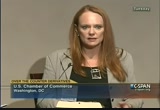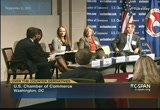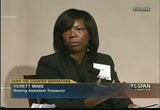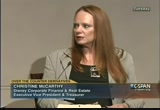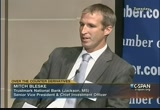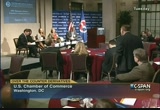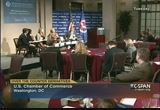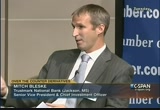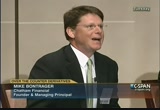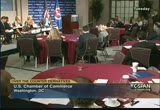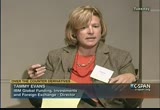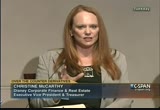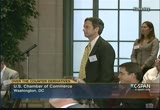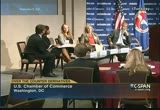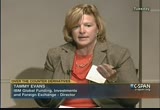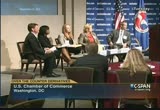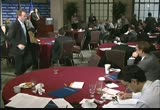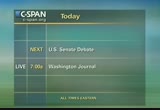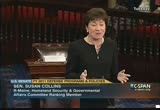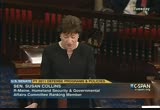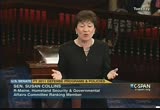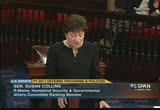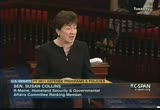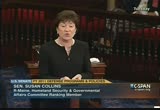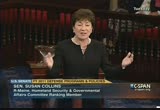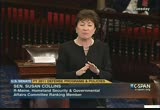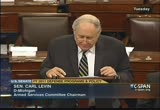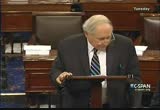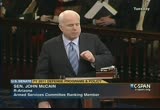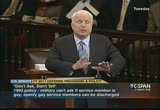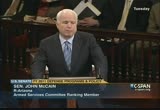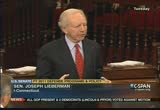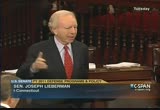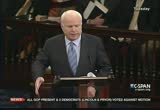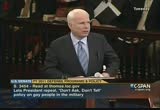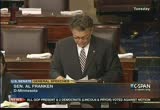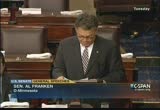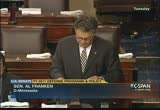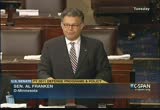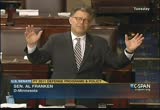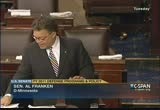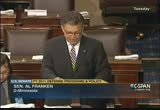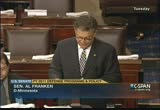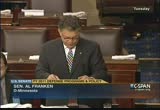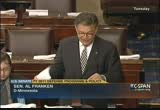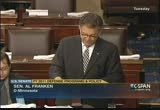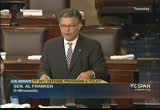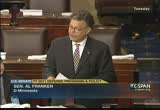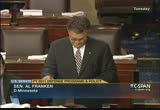tv Today in Washington CSPAN September 22, 2010 6:00am-7:00am EDT
6:00 am
>> i will just add to that, because we hedge, we have not had -- it was some of a lot of volatility in the markets. i collected some companies that were active hedges that had significant losses this last quarter or two due to foreign-exchange exposure. we don't have that. so that the risk we have managed to not managing that because due to the fallout of this legislation if it doesn't work, it would inject a different level of variability on earnings predictability. so it have to be taken into consideration. i would like to be the optimist here and note the rulemaking process will be sanguine and coherent and really address how end-users are utilizing derivatives. >> okay, how do you -- how will
6:01 am
derivatives regulation likely change the way you manage your risks are your business? and mean, certainly there's still questions out there but the rulemaking is going to need to clarify for us. but kind is based on even where you think it's coming out today, how is it going to change what you do? >> well, specifically on the pension side because they did something that was pretty smart a couple years ago they entered into a long-duration program, where we moved more of the pension investments from equity into fixed income. and so also looking at doing more physical interest rate swap. the same is to minimize the interest rate volatility. if you want to add on additional 10 to $15 billion in interest rate depending on how legislation decides to set the initial variation margin, you may forgo doing some of that because so much capital is being set aside and entered into a hedging portfolio pictures they
6:02 am
knew what to limit volatility. but now you're adding this cash component because you have to set aside that much working capital. honestly hopefully the look of the maybe complex securities and do other things and do more net income aware that risk is minimized and so the cache is being set aside. but for us were deathly trying to look at the range of the web is. what if the exempt effexor and of course the portfolio comes down more. so are definitely trying to look at that and see what is the monetary impact can be. >> i get the sample little bit but there is certainly a wide -- does what it can create a very wide potential outcome in terms of how we manage that. is that true? >> yeah, the biggest one for me is the margin requirement because that could impose a real economic cost. i think we can manage a loud the other issues, but the margin requirements good, you know, make us weep inc. how much we
6:03 am
do. i'm a big would never completely eliminate it, but it may impact on our own margin how much activity we engage in. >> i would agree. christine said i'm an optimist that is hopeful we don't fall into the substantial tradition definition and were exempt from some of the more onerous requirements around margin and we can manage through some of the increased cost and still be able to use our derivatives portfolios today. >> clearly which is suspect to little bit of increasing costs. i think the other concern and probably for us and probably even for your wall street banks is the additional capital is going to be requested that we don't know where that will land. i think our hope is that the additional capital will just be commensurate to the risk, to the
6:04 am
true risk as opposed to something that becomes so costly a becomes prohibitive to obviously offer the product at a reasonable price. but i think it's another one that's hanging out on the size of the margin. >> i'd like to just stop now. we can open us up for any questions that we would have from the audience in any of our panels. yes, you can come to the mike, please. >> ron shreve, international master. to take questions. one, within your company, is your department seen us a call center or a potential profit center? and secondly, are there written prohibitions in each of your companies that forbid any of the employees in your department
6:05 am
from accepting gratuities, gifts, travel, et cetera for many of those trade with? >> i can answer that. we are a cost center. no one engages in any speculative act to be. no one in treasury is paid based on trading performance. we have goals and object is completely outside of any kind of trading act today that would go into any compensation. we do offer a very strict code of corporate conduct, which precludes anybody on the staff accepting, you know, gifts, anything with vendors. it's extremely rigid and we think it is appropriate that way. i know we annoy a lot of banks because we never show up in anything. we don't put their trees. we don't guard the boondoggles, but we like to keep our relationships purely professional. >> i would echo the ibm treasury
6:06 am
is a cost honor for sure. and i'm reminded of that. and we also have some very straight -- assembles with any types of gifts and travel. i will say just for the benefit of transparency, we do allow people to attend local conferences been in new york obviously there's a lot of opportunity for training, whether it be about financial legislation or an affect the accounting that comes out in for us it's actually good for the company because it free cheap turning our staff can be a look to go. >> the treasury department is a cost center. no compensation related to trading performance. policy has no speculative trades. it's very clear the customer derivatives policy is very
6:07 am
limited and make sure no trading of the customer. so we will not even be on the other side of the speculative trade. that is only in connection with the lending business. and on the maturity site again with a policy outlining very strict limitations. and it's all too very highly as well. [inaudible] >> either very stringent policy for hedging where anytime i had just been a place that has to be a white papers to go into the control room in the treasury. sam thinks in terms of meals, gifts, gratuities. you have to sign off on a code of conduct heavier. in fact, we have an ethics recommitment tomorrow. and so for us, similar to tammy, we can do local things, but no trips and boondoggles in that type of thing. >> i can say, chatham represents end-users and small companies to large companies using derivatives.
6:08 am
and that is generally the response. i don't -- i don't even know of any that would actually be running the treasury as profit centers. there probably are. i certainly don't ask a question. but this is -- this is exactly i think what she would find across pretty much all of the end-user community. that's a very fair representation. >> other questions? >> there seems to be a fair amount of diversity in this group in terms of how you use derivatives. and i wanted to just ask you a little bit about how maybe -- what sort of guidance we should give the agencies and how they should define commercial risks and for such a critical component of coming out, from the clean exemption from the msp definition, you know, commercial risk is in a sense the key to the extent there is an end-user
6:09 am
exemption in the dodd-frank act. it is certainly one of the keys to it. do you think -- and it appears that the agencies seem to be taken the view that maybe there's a difference between financial risk of managing financial risk versus hedging on financial risk. and how do you think, just in terms of if you think about the whole purpose behind the derivatives title is trying to mitigate systemic risk, how do you think about or what sort of a place to get to the agencies in terms of how they should define commercial risk given how you use hutchison slops yourselves. >> well, one big or a program that we have and i know i've heard chairman gensler give some. and my understanding is he is looking to get, you know, set of examples that would fall into that definition.
6:10 am
but a key program for us is tied to foreign currency cash flows. so we are receiving from other countries in the way of royalties and license fees related to our software. in addition, we've got hardware sales and so there's a cost component of that that has formed currency implications. so for us that's a big one and on a cash flow is tied to that particular cash flow that's related to a cash flow for business. >> we pretty much used that same methodology. were largely distribution company. while we are doing more local product in different countries, selectively a lot of our product is made here and sold outside the u.s. so we're hedging bringing that revenue and income back into
6:11 am
u.s. dollars or i can give you a real specific example of the hedging transaction. about three and half years ago we announced are expanding our cruise business. records from two ships to four shifts so essentially we were doubling it. the ships were very large expenditures. to take a long time to design, build and deliver. so we had your exposure over the century into the contract through the completion of not one, but two ships, which were staggered. so we're talking over a four-year period, we entered into this very structured will recall a a strategic head program for a specific asset. multiyear program of forward some options and over what those ships are going to cost us in that. was tremendous volatility of the euro. and we can remember for about six months and four months the euro was all over the place not
6:12 am
to mention a couple years ago. that's really hedging a known exposure. once again, that's a very specific case. in general were very much like ibm. >> don't be a situation of trying to define it because you cannot intend to hedge without getting hajek counting. and so you can say to have had to come in "the new york times," which i think we'll probably be of the categories. the problem there was we have numerous apache county and msr, which we do use the exchange. they currently do use exchange is unlikely when the products are standard. but unfortunately, i don't know where you go beyond intense because it sounded like intend wasn't going to be enough if you got too large. just in terms of the absolute scale and maybe the underlying credit risk inherent. >> your certainly, we see certainly countries not in the
6:13 am
operational risk that they have but those balance sheet risks as well that are true god street hedges that are not speculative and not speculative investment. nurture how it shows a balance sheet risk that they face. along with that, maybe i could also ask michaels? am i guidance for no one of the concerns of courses being an msp. and being thrown into that bucket or that category. some of you are for large companies with large positions. what guidance would you give there besides not us? >> that's all there is. >> there's some consistent guidance that she think that would be good for the agency to look at when making those
6:14 am
decisions. what other criteria you think would be good for them to follow? >> while a man, one of the criteria has to be with the stomach risk and match overall threshold. it's hard for me to imagine i mean 45 billion is a large number and no. when you look at the total derivatives portfolio that's out there globally, it's hard to believe that's large enough to have a huge impact of systemic risk. >> 45 billion, you're measuring touch >> that's notional. that's not your exposure. obviously our exposure is much less than that from a fair value perspective. so understanding -- i think being a little more lenient on that idea of systemic risk, particularly for the corporate that you have hedge accounting. we've had that conversation as
6:15 am
if you're truly fair and you're not speculative and you've got an underline exposure to derivatives in their match, take that off the board. the argument is continued to come back to this idea of systemic risk here and i think it's trying to match those two and some wine a little bit more to the benefit of the corporate. >> and notional is often the term that gets thrown around. you heard that a lot. but as i believe the measuring stick? or should it be? >> that's a good point because yes we have a very bad notional and from a notional perspective are talking to a $3 billion. so much less exposure positions their value position is opposed the notional, so very good point. >> when there's a number of factors to have an offset of positions, but you also could be in a positive position at anyone time as well depending on rates
6:16 am
for your other hedged items go. so the idea of notional really is just a concept it really doesn't work when you talk about exposure like the derivatives. imagine something you don't tell the story. >> yeah, i think using the notional concept without understanding the business, those are big scary numbers. you know, whether they're 10 billion, 20, 50 billion, those are big numbers. once again looking at it on the market market basis or in that basis i think it's more meaningful. but once again, you have to understand that it's being used for her. [inaudible] vcc is considered an entity in the talk about the commercial divergence of press we want to conference how the leverage ratio is only five to one. so we don't really can understand being highly buffered in the cause we should apply. so i think that's the other thing you should keep in mind.
6:17 am
>> we have other questions? well, maybe not. [laughter] >> right on time and i really want to join -- invite the audience to join in thanking each of the panelists an accident moderator, mike. this was a highly informative panel antennas but the real world together with what we've heard in the chairman's opening remarks and we really appreciate you should be taken the time to come to washington to talk about how the river meets to vote on these issues and what can seem attracted to the real-world impact on jobs and the economy. thank you. [applause]
6:18 am
>> federal health officials have attributed 1600 illnesses to the salmonella outbreak due to contaminated eggs. we will hear from the food and drug administration. beginning at noon eastern on c- span3. "washington journal" begins at the top of the hour. topics include the november elections, u.s. foster care and credit card fees. senate republicans stopped defense legislation that included a repeal of the law banning gays from serving openly in the military. the 53-46 vote fell short of the votes needed to advance legislation. we start the debate with
6:19 am
republican susan collins. >> mr. president, i come to the floor to discuss the defense position crystal clear. i agree with the chairman of the joint chiefs of staff, admiral mike mullen, that the don't ask, don't tell law should be repealed. it should be repealed, contingent upon the certain fictions ocertifations of the p, the secretary of defense and the chairman of the joint chiefs of staffhat its repea would not have an adverse impact on military readiness, recruitment and retention. and those are, mr. president,
6:20 am
extly the provisions that are included in the defense authorization bill. my view is that our armed forces should welcome the service of any qualifiedndividual who is willing and capable of serving our country. the bottom line for me is this. if an individual is willing to put on the uniform of our country, to be deployed in war zones like iraq and afghanistan, risk his or her life for our country, then we should be expressing our gratitude to those individuals, not trying to exclude them from serving or expel them from the force.
6:21 am
that is why, mr. president, during consideration of this bill in may i supported the compromise provisions that were put forth by senator lieberman and senator levin. at a previous senate ard services committee hearing, i asked admiral mullen if there were any evidence at all that allowing gay and le lesbian tros to serve had harmed military readiness in those countries that allow their service now. at least 28 countries, including great britain, australia, canada, the netherlands, and israel, allow open service by lesbian and gay troops. we have no greater allies than
6:22 am
great britain, austria, canada, and israel, and none of these countries, not one, reports morale or recruitment problems. at least nine of these countries have deployed their forces alongside american troops in operation iraqi freedom, and at least 12 of these nations are allowing open service and are currently fighting alongside u.s. troopsn afghanistan. there's a cost involved in our current policy. according to a 2005 g.a.o. report, american taxpayers spend more than $30 million each year to train replacement for gay troops discharged under the don't ask, don't policy.
6:23 am
the total costs reported since the statute was implemented, according to g.a.o., has been nearly $200 million and that doesn't count the administrative and legal costs associated with investigations and hearings. the military schooling of gay troops, such as pilot training and linguist training. we are losing highly-skilled troops to this policy. according to the g.a.o., 8% of the service members let go under don't ask, don't tell held critical occupations defined as services such as interpreters, 3% had skills in an important foreign language such as arabic, farsi or korean. more than 13,000 troops have been dismissed from the military simply because o their sexual
6:24 am
orientation since president clinton signed this law in 1993. mr. president, society has changed so much since 1993, and we need to change this policy as well. but let me say, mr. president, that i respect the views of those who disagree with me on this issue, such as the ranking member of the senate armed services committee, senator mccain, and i will defend the right of my colleagues to offer amendments on this issue and other issues that are being brought up in connection with the defense authorization bill, and there are many controversial issues in this bill. they deserve to have a civil,
6:25 am
fair and open debate on the senate floor, and that is why i am so disappointed tha rather than allowing full and open debate and the opportunity for amendments from both sides of the aisle, the majorit leader apparently intends to shut down the debate and exclude republicans from offering a number of amendments. this would be the 116th time in this congress that the majority leader or another member of the majority has filed cloture rather than proceeding to the bill under an agreement that would allow amendments to be debated. what concerns me even more is the practice of filling up the
6:26 am
amendment tree to prevent republican amendments, and if that is done on this bill, it will be the 40th time. now, mr. president, i find myself on the horns of a dilemma. i support the provisions in this bill. i debated for them. i was the sole republican in the committee that voted for the liebermalevin language on don't ask, don't tell. i think it's the right thing to do. i think it's only fair. i think we should welcome the service of these individuals who are willing and capable of serving their country, but i cannot vote to proceed to this bill under a situation that is going to shut down the debate
6:27 am
and preclude republican amendments. that, too, is not fair. so i'm going to make one final plea to my colleagues to enter into a fair time agreement that will allow full and open debate, full and open amendments to all the provisions of this bill including don't ask, don't tell, even though i will vote against the amendment to strike don't ask, don't tell provisions from this bill. now is not the time to play politics simply because an election is looming in a few weeks. again, i call upon the majority leader to work with the republican leaders to negotiate
6:28 am
an agreement on the terms of debate for this bill so that we can debate this important defense policy bill this week, including the vital issue of don't ask, don't tell. thank you, fair for us to be using up all of our time in advance. mr. president, this morning a number of republican senators stated that they would support the current filibuster of this bill because they were afraid that if we take up this bill, we're going to have a closed process that would limit their ability to offer amendments. now, the majority leader has addressed this issue. he specifically said last thursday that he's willing to work with republicans on a process that will permit the senate to consider these matters and complete the bill as soon as possible. he's very clear on this thing. he is not trying to prevent other amendments from being offered. however, mr. president, there aren't going to be any amendments -- there's not going to be any opportunity too vote on any amendments unless we get 60 votes to overcome the current fibilityd and proceed to the
6:29 am
bill. -- the current filibuster and proceed to the bill. it makes no sense for senators to block all amendments, which is what the effect will be if we don't end this filibuster, to deny consideration of this bill so we can consider amendments. it makes no sense to do that under the guise of wanting an open amendment process. we're pea not going to have any amendments unless we can get to this bill, unless we end this filibuster. amendments are appropriate. we've always had amendments on the defense bill. the majority leader assures we're going to do that again, and i would do everything i can to make sure that's true as chairman. so the issue today is not whether or not there's going to be specific amendments in order. it's whether we're going to get to the bill so we can try to consider amendments to the defense authorization bill. there's many amendments that should be considered, and i hope that we cannot continue this filibuster. i hope we can get 60 votes and do the important work of the nation which is to get a defense authorization bill passed after
6:30 am
it's been considered. i would yield the balance of my time. mr. mccain: how much time do i have? the presiding officer: minutes and 50 seconds. mr. mccain: mr. president, this is obviously an important vote that is coming up. and i repeat, i'm not opposed in principle to bringing up the defense bill and debating it, amending it and voting on t i am not opposed to have full debate on whether to repeal don't ask, don't tell and then allow the senate to legislate. i am opposed to bringing up the defense bill right out in before the defense department has completed its defense bill right now because we need to know the views of the men and women who are serving in the military in uniform. give them a chance to tell us their views, whether you agree to or disagree with the policy, whether you want to keep it or repeal t the senate should not
6:31 am
be forced to make this decision now before we've heard from our troops. we've asked for their views, and we should wait to hear from them. and all four service chiefs have said the same thing: let's conduct the survey, let's get it dorntion and then act on whether to repeal or not repeal. there's one other aspect of this, mr. president. this is a blatant political ploy in order to try to galvanize the political base of the other side which is facing a losing election. that's why the majority leader said we would take up don't ask, don't tell, take up the "dream" act and then take up the issue of secret holds and then address the other issues after the election. i wonder why the majority leader would have those priorities? in other words, take up those that would be politically beneficial, galvanize its political base as far as the hispanic community is concerned and the gay and lesbian community, and then take up the
6:32 am
other issues after -- after the election is over in lame-duck session. i have -- this majority leader has invoked -- has filled up the tree and has not allowed debate 40 times -- 40 times -- more than all the other majority leaders ahead -- before -- preceding him. and we need -- and last year the hate crimes bill was arranged in such a way that there would not amendments that were -- that were -- could be proposed by my side of the aisle. so let's vote against cloture, sit down and try to reach some kind of an agreement. let the men and women in the military be heard from. let their leaders go to their men and women who are serving and tell them that we have heard your input before we make this legislative change and stop the cynical manipulation of the men
6:33 am
and women in the military in order to get votes on november 2. mr. president, i reserve the balance of my time. mr. levin: how much time do i have? the presiding officer: two minutes. mr. levin: i yield the time to the senator connecticut. mr. lieberman: thank senator levin. i rise to oppose the filibuster of the national defense authorization act and to say what is obvious, that there's -- this is a preelection campaign season. there's a lot of politics, partisan politics swirling swir. everything going on is procedural. but there's two things that i know. i want to express them about this vote coming up. one is, we have to proceed to consider the national defense authorization act.
6:34 am
if we don't do it today, i hope we'll do it as soon after as we can because our military needs it. they're in imavment without this legislation passing -- they're in combat. without this legislation pass, we will not have the increased compensation and benefits for the military and their families. we will not have authorization for critical military construction. we'll not have authorization for acquisition of critical military equipment that our troops need to fight safely on our bafnedz and to remain what -- on our behalf, and to remain what they are, the bravest, most effective fighting force in the world. so it may not be today. but it will be sometime before the end of the year that we've got to take this bill up. it is our national constitutional, moral responsibility. second, and this is a controversial part, of course, i believe that we've got repeal don't does, don't tell. not only because it's not consistent with american values of equal opportunity, of judging people by whether they can do a job or not, not not by their
6:35 am
nationality, their religion, their gender, their race or their sexual orientation. can you do a job? and if you can do it, then you can get that job in america. and we've got thousands of americans who are patriotic, who want to serve, who happen to be gay or lesbian, and we're telling them, you can't. and not only that, we've kicked out 14,000 of them in the last 17 years under don't ask, don't tell. the presiding officer: the majority time has expired. mr. lieberman: at some point we're going to come to a vote and on don't ask, don't tell. i believe a majority of my colleagues in this chamber -- maybe more than that -- are going do quhai think we need to do, which is to repeal don't don't ask, don't tell. i thank the chair. the presiding officer: the senator froms a has two minutes and 45 seconds. mr. mccain: i just want to emphasize again, mr. president, the statements of the service chiefs. general george casey, "i remain convinced it's critically important to get a better
6:36 am
understanding of where our soldiers and families are on this issue and what impacts readiness and unit cohesion might be so i can provide informed military advice to the present congress." i believe that repealing the law before the completion of this review will be seen by the men and women of the army as a reversal of our commitment to hear their views before moving forward." admiral roughead. my concern is that legislative changes at this point regardless of the precise language used may cause confusion on the status of the law and the fleet and disrupt the review process itself by leading sailors to question whether their input matters. john conway, "i encourage the congress to let the process the secretary of defense created to run its course." general swartz, "i believe it's important to keep the matter -- the matter of keeping faith with those currently serving in the armed forces that the secretary of defense commission review be completed before there is any legislation to repeal the don't ask, don't tell law."
6:37 am
mr. president, let's listen to the people who we've placed in charge of the men and women in the military. this is not the time to move forward on this issue, particularly with a political campaign at its highest. so i hope my colleagues will oppose the cloture vote and let's hear a statement in favor of the men and women who are serving in the military.y.y.y.yg business. the presiding officer: without objection. mr. franken: thank you, mr. president. i rise to discuss two important issues that we won't have a chance to debate because we're unable to take up the defense authorization bill. let me start with the need for repeal of the discriminatory don't ask/don't tell policy. we're so clo to making a historic accomplishment that i think we'll be able to look on with pride and it's also simply
6:38 am
just the right thing to do. this country is long past ready for it. it's the right thing because the don't ask/don't tell policy has been costly for our military. treating gays and lesbians unequally becausef their sexual orientation just doesn't make sense to me. we should not be denying gay and lesbian americans the ability to serve our nation simply because of who they are. we should not make them l in order to serve. the chairman of the joint chiefs of staff, admiral mike mullen, endorsed the repeal of don't ask/don't tell. he put it in this way and i quote -- "i cannot escape being troubled by the fact that we have in place a policy which forces yng men and women to lie about who they are in order to defend their fellow citizens. for me, personally, it comes
6:39 am
down to integrity, theirs as individuals and ours as an institution." but as i said, this isn't just about the right thing to do. the country is ready for it and the military is ready for it. things have changed since 1993 the cotry is now way ahead of us on this issue. "washington post"/abc news poll in february february 2010 showed that 75% of americans believe that gay and lesbian americans ought to be able to serve openly in the united states military. 75%. there's almost nothing that we can get 75% of the country to agree on these days. the country has been steadily moving in this direction for some time. in 199374% favored this. it was up to 62% in 2001 and now
6:40 am
we're at 75%. multiple other polls reinforce this result. the country is way past being ready for this change and so is the military. do we need to think carefully about how to implement repeal? yes. that's why the pentagon is undertaking a comprehensive review of how to implement the repeal. there is any reason to think that unit cohesion or military readiness will be negatively affected? no. there is no reason to think that. in fact, let's look to military's own thinking on this question. a recent article in "joint force quarterly" concluded -- quote -- "there is no scientific evidence to suprt the claim that unit cohesion will be negatively affected in homosexuals serve openly." no scientific evidence. let me also briefly tell you
6:41 am
about my experience. before i was a senator, i did a number of u.s.o. shows over -- tours over the years. on each tour, i was more and more impressed with the men and women of the military. this is between 1999 and 2006. i did seven tours. the last four years i was in iraq and afganistan. we'd go -- and kuwait. i'd go with a tour of very ecletic tour of guys and women. dallas cboy cheerleaders, country western artists. almost all of them were very right wing. and we loved each other because we went on these tours. let me tell you about one show that i did -- i'm not going to say what tbaifs. i won't -- what tbaifs.
6:42 am
i don't want to -- base it was. i don't want to get anybody in trouble. we did a four-hour show -- this is the fourth year we did it with the sergeant major of the army. we did a four-hour show because we found out the troops loved the show. because it was a little bit of home. and during the show i would -- i was kind of a co-host with a beautiful woman named leeann tweeden and we did comedy routines. and i do a monolog. and this is something i had done for a number of years. and i'd go out and i'd say, you know, i've done nowp seven u.s.o. tours and every year i'm more and more impressed with the military and one thing i don't get is the don't ask/don't tell policy. and now this is -- it's about
6:43 am
28-degrees where i'm talking and there's maybe a couple of thousand troops. most of them are standing. some are in bleachers. and this is like three hours into the show, but they're just loving the show. and i said, there's one thing i don't understand, it's the don't ask/don't tell policy. we all know that brave gay men and women have served in their country's uniform throughout its history. and we have this policy. take, for example, general ith. and i pointed to the commander of the base. i said, now here is one of the bravest men ever in the history of our country to don our nation's uniform in battle and yet he's one of the gayest men i ever met. and they started laughing and cheering. i said, now, why shod general smith have to stay in the closet
6:44 am
when he's such a great leader? general smith stand up and wave. and he got up and waved and everyone cheered and then the bleachers -- in the bleachers there were a group of women soldiers who cheered extra loud and waved at them and he waved back at them. and at the end of the show the general -- at the very end of the show was saying -- singing "american soldier" by toby keith. i don't know if you know that song, but it's a beautiful song. and i will always have this from doing u.s.o. tours and seeing soldiers with their arms around each other crying an singing, i don't do it for the money. i've got bills that i can't pay. and at the end of the show the general came up and he gave this beautiful frame with an american
6:45 am
flag that had flown over the base. and he gave it tovery member of our troop. and when he gave it to me, he said, al keep telling those don't ask/don't tell jokes. i think you may have some fans up there, and he pointed at those women. and later, those women came up to me and said we're gay. and they're -- i mean, i think everybody knew it. and this is 2006. this is when it was really hard for the military to recruit people. and so they gave waivers out at
6:46 am
that time. and they gave waivers for -- moral waivers, and they gave waivers for people who didn't do as well in school or didn't graduate school. and i swear, if you ask every man and woman on that base, who would you rather have standing to your right, standing to your left, that gay man or that gay woman who has been serving with you the last year, or somebody comes in here with a moral waiver and those troops who had moral waivers, many of them served very honorably and bravely, or some with a cognitive waiver, many of those flourished in the military and are doing great things. if you asked of them, they say i want that gay soldier or that lesbian soldier who i know and
6:47 am
has been on my right and on my left. all gay and lesbian service members want to be able to serve. instead, people are getting kicked out of theilitary. people who don't need any moral waiver, people who don't need standards lowered for them in order to serve. people who are patriotic and courageous and who have vital, irreplaceable skills. what's more, the evidence is clear from other countries that have a lot of gays and gay and lesbian citizens who serve openly in their military, san collins spoke about this today. the evidence shows there will not be a problem. ask the israelis, ask the canadians, ask the british. they have all successfully implemented open service.
6:48 am
it's not that the military is ready for this change, don't ask, don't tell, it's costly for the military. thousands of capable americans with needed skills have been kicked out of the military because of this foolish poly and this policy alone. these are soldiers, airmen, sailors who we have invested time and training in. we really can't afford to lose dedicated personnel with critical skills when we're engaged in two wars. on top of that, do we really want our military officers spending valuable time and resources, investigating, kicking troops out of the military for being gay? the argument offered by some opponents is that this legislation goes back on the promise to take into account the comprehensive review being conducted by the pentagon, but that's just a canard. let me remind you what secretary gates said about the review when he testified before the armed services committee back in
6:49 am
february. secretary gates said, and i quote -- "i fully support the president's decision. the question before us is not whether the military prepares to make this change but how best to prepare for it." not whether, but how the secretary of defense. that process is going forward, and the provision in this bill repealing the flawed don't ask, don't tell policy does nothing, nothing to interfere with the pentagon's process. all the provision does is repeal the existing law. it does not tell the d.o.d. how to implement the repeal. what's more, the repeal itself doesn't go into effect until after the pentagon's comprehensive view is complete, and the president and the secretary of defense and the chairman of the joint chiefs of staff have certified that the department of defense has prepared the necessary policies necessary for implementation. they also must certify that the implementation is consistent
6:50 am
with military readiness, effectiveness, unit cohesion and recruiting and retention. to be honest, i'm not fully satisfied with that compromise. i wanted a moratorium on discharges in the meantime, but that's the compromise and it doesn't undercut the pentagon's review in any way. don't ask, don't tell makes no sense. it's foolish, it's unjust, and we must end it. the country is ready, the military is ready, and it is the right thing to do. i urge all of my colleagues to stand for equality and for common sense and to stand up for our troops. it's long past time to end don't ask, don't tell. we will be proud that weid. now let me turn to the "dream" ac which also would have come if we had been able to get cloture andoved to the defense authorization bill.
6:51 am
minnesota is what it is today because we welcomed immigrants with open arms. we welcomed the swedes who first tilled our fields and built our railroads. we welcomed the norwegians who thrived in our lumber industry and founded choirs that remain the best in the world today. we welcomed the danes who made our state a leader in dairy farming. we worked the finns and the czechs. in fact, from the time we were admitted to the union in 1858 until 1890, no less than one-third of minnesotans were born abroad. today, most of the people that we welcome don't come from europe, they don't speak swedish or german. they speak spanish or hmong or
6:52 am
somali. they aren't a third of our population. just 7% of minnesotans were born abroad, so there are few -- far fewer immigrants in minnesota by percentage. mr. president, let me tell you, these folks work just as hard and theyhow just as much promise. and so, mr. president, i rise today to speak in support of t "dream" act, because justy passing this law, we can do something remarkable to help those minnesotans, at least some of them. th is a group of young people who are brought here by their parents, they were raised as americans and f the most part speak english just like you and i. but because their parents made a mistake, because their parents broke the law and entered the country illegally or overstayed a visa, these kidsre stuck. they can't go to college, they can't get jobs,hey can't join our military. they are out of luck, and our
6:53 am
society is going to pay for it. the "dream" act would allow these students to re-enter society, it would allow them to come out of the shadows of society to study or to serve in our country's military. i want to put faces to the young people of minnesota who would benefit from the "dream" act, and i'm going to change their names to protect their identity. there is a young man named danny. daniel came to the united states fromolombia when he was 8. he grew up in the suburbs and ran varsity track and cross country for his high school. since he couldn't get a driver's license, he took a two-hour bus ride every day just to get to classes at normandale community llege. in his second year, daniel's father died, leaving daniel and his mother without any income. daniel almost dropped out but he didn't. instead, he became the first member of his family to graduate
6:54 am
from college, dual associate -- degrees in science. daniel is now at the university of minnesota. he is trying to get his bachelor's degree, but since he can't work, he can't afford to attend school full time. so every semester, daniel saves up all of his money to take just one class. he is completing his bachelor's one class at a time. there is another remarkable young minnesotan, javier, who came to this country at the age of 15. he enrolled in a st. paul high school and quickly learned english. by his senior year, he was taking advance placement in college courses and volunteering at the state capitol. he even staed to like the weather in minnesota. today, javier is an elected leader of student government at a college in our state. he has become a role model, not just for immigrants but for all
6:55 am
his fellow students. javier wants to dedicate his career to improving our education system, but because of a decision his parents made, he can't. i get letters from students like this all the time. many of them are just as talented, and all of them ask me for the same thing: the opportunity to work hard for this country. let me repeat that. they only ask for the opportunity to work hard for this country. another young woman wrote me to ask, and i quote -- it's not a question which she wrote me. she said -- "we do not want welfare or any money. we are not asking for immunity from the law. we are asking for a chance to come out to the light and live
6:56 am
like anyther person. there are a lot of reasons why we should help them. the first reason, it is the smart thing to do. "some of my colleagues have stood here and said they couldn't believe the "dream" act could be included in the defense authorization bill. in fact, the defense department has authorized the "dream" act since the bush administration. this bill is actually pt of our nation's strategic defense plan -- hence, in the defense authorization bill, they will incentivize and reward students to wear our nation's uniform, and our nation will be safer because of it. here's another reason why thi is smart. we don't want kids like javier doing dishes. we don't want kids like daniel taking ten years to get his bachelor's degree. we want them studying, contributing to our economy and serving in our military.
6:57 am
but there is a far more important reason we should pass the "dream" act, and that is becae it is the right thing to do. mr. president, there is a passage in live it -- in liviticus, a book that appears in the old testame and the torah that i think is appropriate here. leviticus is a book of laws. it is said to describe god's covenant with the israelites. this is chapter 19, verse 33." when the foreigner resides with you in your land, you shall not oppress the foreigner. the foreigner who resides with you shall be to you as the citizen among you. you shall love the foreigner as yourself, for you were foreigners in the land of egypt
6:58 am
." mr. president, these are children. we need to help them. they have learned in our schools, they have played with our kids, and they want to serve our country. we just need to give them a chance. thank you, >> which included ending "don't ask don't tell rules" for gays in the military and immigration provision. the vote was 56-43. four short of the 60 votes needed. for more information, visit c- span.org. >> the c-span networks, would provide coverage of politics,
6:59 am
public affairs, nonfiction books, and american history. all available to you on television, radio, on line, and social media networking sites and find our content any time on c-span video library. and we take c-span on the road with our local content vehicle, bring in resources to your community. washington your way. c-span networks. now available in more than 100 million homes. created by cable, provided as a public service. >> "washington journal" is next. we will take your calls. former fbi director robert muller and homeland security secretary janice m. the top -- janet napolitano testify about terrorist threats. coming up this hour, we will talk with vermont congressman peter welch about credit card fees and regulations. after that, republican representative greg walden
138 Views
IN COLLECTIONS
CSPAN Television Archive
Television Archive  Television Archive News Search Service
Television Archive News Search Service 
Uploaded by TV Archive on

 Live Music Archive
Live Music Archive Librivox Free Audio
Librivox Free Audio Metropolitan Museum
Metropolitan Museum Cleveland Museum of Art
Cleveland Museum of Art Internet Arcade
Internet Arcade Console Living Room
Console Living Room Books to Borrow
Books to Borrow Open Library
Open Library TV News
TV News Understanding 9/11
Understanding 9/11